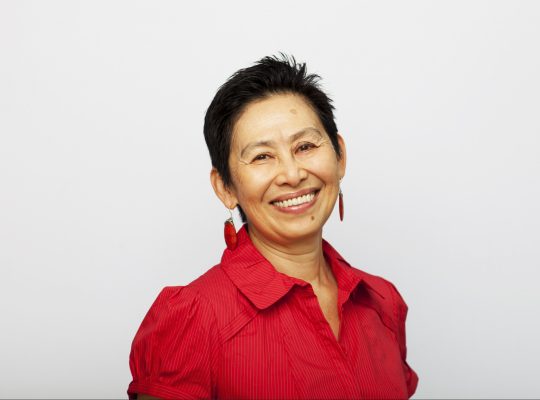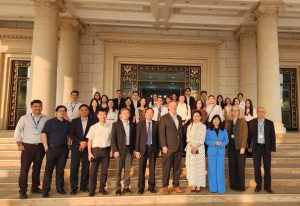Preventing Unwanted Pregnancies in Minority Youth in Australia: An Exploration on Contraception Decision Making
In Australia, youth from racial and language minority background might become young parents without their willingness and adequate preparation to enter parenthood, more so than those from the general population. Many of these unwanted pregnancies presumably resulted from a lack of knowledge on contraception use or access to reproductive health support services (Dune, Astell-Burt et al., 2017; Dune, Perz et al., 2017). Understanding the contraception practices of youth will help us determine if awareness and adequate access are factors to prevent unwanted pregnancies.
In a recent research published in Australian Psychologist, Pranee Liamputtong, Professor of Behavior Science in the College of Health Sciences at VinUniversity, and her research team explored contraception practices among CALD (Culturally And Linguistically Diverse) youth. “We unraveled decision making processes and tools the teenagers prefer to use outside conventional understandings”, Professor Liamputtong said. The findings indicate that contraception use evolves from user experiences, information they can access, and cultural safety considerations (derived from social norms and values of the users).

Pranee Liamputtong, Professor of Behavior Science,
College of Health Sciences, VinUniversity
Source: VinUniversity
The team employed interviews and focus group to conduct research using an exploratory-descriptive qualitative research method. The focus group comprised 27 CALD young men and women, age 16 – 24, from a socio-economic deprived region in Australia. “The focus group method was adopted as it allowed the young people to interact with each other and this helped them to feel at ease discussing sensitive issues within the group. The method has been adopted widely in researching sensitive topics”, Professor Liamputtong said.
The study sampled both female and male youth to get a holistic understanding of the issues, recognizing that men also participate in and influence decisions regarding contraception use. Even though the sample size for the study was small, the data are credible and trustworthy, as all the participants were self-selected and highly invested in the topic. For analysis, the research team used Interpretative Phenomenological Analysis (IPA) to identify emerging themes; and used a three-phase procedure to analyze the data and to ensure data analysis validity.
Focus group: a small-group discussion guided by a leader or moderator
Source: https://www.naylor.com/associationadviser/tips-for-conducting-focus-groups/
The youth reported that they were highly confident in using contraception that several of them have used different types of contraception methods. The majority selected implanted methods as most effective method, because of the convenience, dependability, and ease of use. Participants also mentioned “Double-up”- where two types of contraception methods are used – as a method to reduce personal anxiety concerning contraception safety. Thus, we concluded that contraception use was widely accepted among the CALD youth and that these youth also had a very good personal understanding of the choices that they made in this regard.
Participants also stated their preference for consulting online resources for information about contraception use, as opposed to parents, peers or community organizations, even though social media skills and risk of exposure to family were barriers to accessing necessary information. Many participants reported that they were uncomfortable talking to parents about sexual health and that this discomfort is rooted in the existing beliefs and social norms that stigmatize discussing sex-related topics.
The youth preferred contraception services that were easy-to-access and provided the most discretion. Access to contraceptives was tricky for many participants because of daily routines that involved high level of parental involvement, such as pick-up and drop-off by parents, compounded by the discomfort in seeking parent consent in sexual activities.

A group of Culturally and Linguistically Diverse (CALD) Youth in Australia
Source: City of Greater Geelong, Multicultural Youth Network Geelong; April 2015
http://refugeehealthnetwork.org.au/culturally-and-linguistically-diverse-youth-needs-assessment-report/
To prevent unwanted pregnancies among CALD youth, the findings suggest to improve the quality and reliability of the online information on contraception and better counselling on method safety and alternatives. For future research, “the findings of this study can be conceptually adopted for research involving young people from Vietnam and CALD youth of Vietnamese origin in Australia and elsewhere”, said Professor Liamputtong.
You can access the full text of the article HERE.
By Nguyen Thi Kieu Oanh
Contraception decision making by Culturally and Linguistically Diverse (CALD) Australian youth: an exploratory study was published in Australian Psychologist, September, 2021.
Elias Mpofu, Syeda Z. Hossain, Tinashe Dune, Abdolvahab Baghbanian, Michaels Aibangbee, Rashmi Pithavadian, Pranee Liamputtong & Virginia Mapedzahama (2021) Contraception decision making by Culturally and Linguistically Diverse (CALD) Australian youth: an exploratory study, Australian Psychologist, DOI: 10.1080/00050067.2021.1978814
References
Dune, T., Astell-Burt, T., & Firdaus, R. (2017). The built environment and sexual and reproductive health. Australian and New Zealand Journal of Public Health, 41(5), 458–459.
https://doi.org/10.1111/1753-6405.12690
Dune, T., Perz, J., Mengesha, Z., & Ayika, D. (2017). Culture clash? Investigating constructions of sexual and reproductive health from the perspective of 1.5 generation migrants in Australia using Q methodology. BMC Reproductive Health, 14(50), 1–13. https://doi.org/10.1186/s12978-017-0310-9



![[Job Opening]: Teaching Assistant for Research Minicourse Development at VinUniversity](https://vinuni.edu.vn/research/wp-content/uploads/2024/07/hiring-7062502_1280-300x143.jpg)